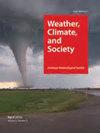预测不一致性和概率预测对用户信任和决策的影响
IF 1.9
4区 地球科学
Q3 ENVIRONMENTAL STUDIES
引用次数: 0
摘要
当重大天气事件的预报提前几天开始时,更新的预报可能更准确,但与原始预报不一致。有证据表明,由此产生的不一致可能会降低用户的信任。然而,在预测中加入不确定性估计可以减轻由于预测不一致而造成的信任损失,正如预测不准确所显示的那样。为了评估这一假设,本文报道的实验测试了在一系列一致性和准确性都不同的原始和修订的预测对(基于历史记录)中,将概率积雪预测添加到单值预测中对信任的影响。参与者对预测的信任程度进行评级,并据此做出关闭学校的决定。一半的参与者收到了单值预测,另一半还收到了6英寸或更多英寸的概率(分配任务中的决策阈值)。与先前的研究一样,预测不准确对信任是有害的,尽管概率预测会减弱这种影响。此外,纳入概率预测使参与者能够做出更经济的决策。令人惊讶的是,在这项研究中,不一致增加了而不是减少了信任,也许是因为它提醒参与者注意不确定性,并导致他们做出更谨慎的决定。此外,不一致性对信任的正向作用通过概率预测的加入得到增强。这项工作对实际设置具有重要意义,表明概率预测和预测不一致性都为决策者提供了有用的信息。因此,公众可以从精确的不确定性估计和更新、更可靠的信息中获益。本文章由计算机程序翻译,如有差异,请以英文原文为准。
The Impact of Forecast Inconsistency and Probabilistic Forecasts on Users’ Trust and Decision-Making
When forecasts for a major weather event begin days in advance, updates may be more accurate but inconsistent with the original forecast. Evidence suggests that resulting inconsistency may reduce user trust. However, adding an uncertainty estimate to the forecast may attenuate any loss of trust due to forecast inconsistency as has been shown with forecast inaccuracy. To evaluate this hypothesis, the experiment reported here, tested the impact on trust of adding probabilistic snow accumulation forecasts to single value forecasts in a series of original and revised forecast pairs (based on historical records) that varied in both consistency and accuracy. Participants rated their trust in the forecasts and used them to make school closure decisions. Half of participants received single-value forecasts and half also received the probability of 6 or more inches (decision threshold in the assigned task). As with previous research, forecast inaccuracy was detrimental to trust although probabilistic forecasts attenuated the effect. Moreover, the inclusion of probabilistic forecasts allowed participants to make economically better decisions. Surprisingly, in this study, inconsistency increased, rather than decreased trust, perhaps because it alerted participants to uncertainty and led them to make more cautious decisions. Furthermore, the positive effect of inconsistency on trust was enhanced by the inclusion of probabilistic forecast. This work has important implications for practical settings, suggesting that both probabilistic forecasts and forecast inconsistency provide useful information to decision makers. Therefore, members of the public may well benefit from well-calibrated uncertainty estimates and newer, more reliable information.
求助全文
通过发布文献求助,成功后即可免费获取论文全文。
去求助
来源期刊

Weather Climate and Society
METEOROLOGY & ATMOSPHERIC SCIENCES-
CiteScore
3.40
自引率
13.60%
发文量
95
审稿时长
>12 weeks
期刊介绍:
Weather, Climate, and Society (WCAS) publishes research that encompasses economics, policy analysis, political science, history, and institutional, social, and behavioral scholarship relating to weather and climate, including climate change. Contributions must include original social science research, evidence-based analysis, and relevance to the interactions of weather and climate with society.
 求助内容:
求助内容: 应助结果提醒方式:
应助结果提醒方式:


